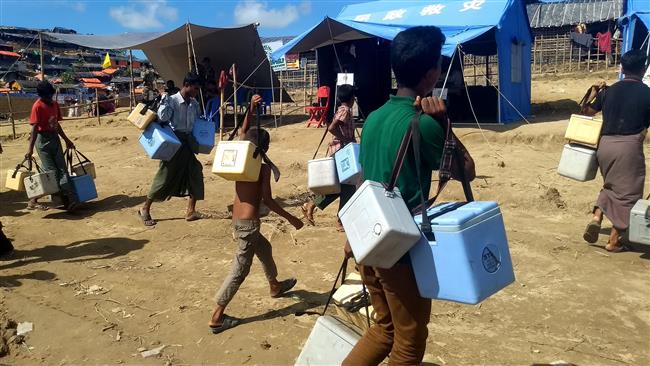Cholera risk 'ticking bomb' for Rohingya refugees
The threat of cholera is like a "ticking bomb" for Myanmar's persecuted Rohingya refugees who have flooded into Bangladesh, the head of the International Federation of Red Cross and Red Crescent Societies (IFRC) says.
In a recent interview, Elhadj As Sy said unhygienic conditions could see the disease spread at refugee camps into which more than 600,000 Muslims have crammed in Bangladesh's Cox's Bazar district.
"We have every reason to fear that we can get into a situation that can lead to cholera outbreaks. We are definitely sitting on a ticking bomb," he said.
Sy, who spent three days in Cox's Bazar last week, went on to say that the conditions there were "difficult to describe" and "very heartbreaking."
One of the biggest concerns is the poor sanitation and lack of hygiene facilities that has sparked growing fears over the emergence of cholera in overpopulated camps.
The IFRC has treated numerous patients for acute diarrhea at a field hospital near the camps in recent weeks. The hospital has also treated thousands of people for a range of other ailments, including injuries suffered in Myanmar along the treacherous route to Bangladesh.
At the same time, the United Nations began a massive vaccination campaign in a bid to avoid a cholera epidemic but Sy warned unhygienic conditions could see the disease spread.

Cholera not the only threat
Sy said a surge in measles cases among children in the camps was also "quite worrisome." He pointed out that five new cases were detected during a single day of his visit.
So far, 67 cases of the highly contagious virus have been registered but Bangladeshi authorities insist the situation is under control, with a mass vaccination campaign underway.
Sy stressed that the IFRC was bracing for a drawn-out crisis.
"We have definitely to project ourselves into a longer future, and it is very difficult to see how long that future will be, but definitely not six months, definitely not even one year," he said.
Elsewhere in his remarks, Sy urged the international community to "respond very urgently at the scale and magnitude that is required to alleviate the human suffering and also save lives."
Rohingya Muslims have fled the predominantly-Buddhist Myanmar to neighboring Bangladesh since August 25, when the crackdown on the Rohingya intensified in Rakhine State.
Many of those who have fled have told harrowing accounts of rape, murder, and arson at the hands of Myanmar’s forces and Buddhist mobs, in what has been branded “an ethnic cleansing campaign” against the minority group.
Estimates as to how many Muslims have been killed vary from 1,000 to 3,000.
So far, some 200 Rohingya refugees have drowned as they attempted to cross a border river that separates Myanmar and Bangladesh.
The United Nations has described the Rohingya as the most persecuted community in the world.
VIDEO | Press TV's news headlines
VIDEO | US-Israeli genocide: Will Gazans see ceasefire deal achieved?
VIDEO | Grief strikes Parachinar: 44 lives lost in terror attack
VIDEO | Yemen’s armed forces target Israeli airbase amid nationwide pro-Palestinian rallies
Putin vows more test of new hypersonic missile
VIDEO | Jordanians continue rallies to denounce Israeli genocide in Gaza, Lebanon
6 Israeli soldiers commit suicide: Reports
Diplomat discourages recourse to pressure, intimidation, confrontation against Iran










 This makes it easy to access the Press TV website
This makes it easy to access the Press TV website